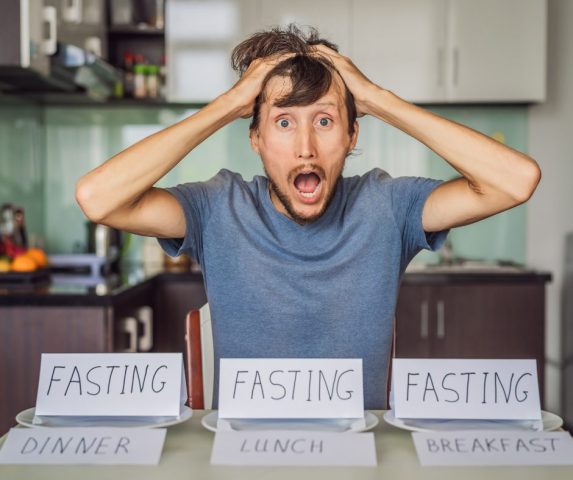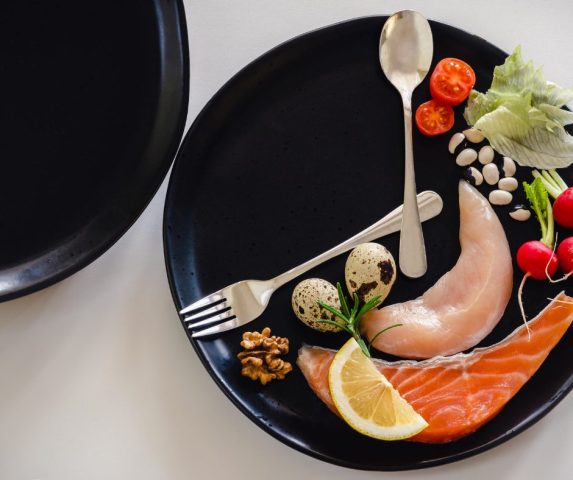What To Eat During Intermittent Fasting: Complete Guide 2024
By Vanessa Richards
January 10, 2024 • Fact checked by Dumb Little Man

Presently, the most popular fitness trend is intermittent fasting. People resort to this fasting pattern to reduce body weight, get healthier, and lead a healthy lifestyle.
Fasting has traditionally been performed across countries for its health benefits. It has also been done for spiritual practices.
However, modern science has linked fasting to several health benefits rather than regularly eating small meals. Fasting occasionally can help control blood sugar, reduce inflammation in the body, and promote better digestion and heart health.
Here, we will tackle everything about intermittent fasting. That includes what to eat during intermittent fasting, when to eat, and foods to avoid when practicing this health regime.
What To Eat During Intermittent Fasting: What is Intermittent Fasting?

Intermittent fasting is a cyclical pattern of eating and fasting for specific hours. Instead of restricting your diet, it specifies the time frame within which you should eat and when you should fast.
It is not a diet chart but rather a routine featuring time-restricted eating. This is an eating plan that people follow for the best results. It functions as a cycle that regulates between a few hours of eating normally and a few hours of fasting.
The New England journal suggests time-restricted eating can turn the metabolic switch and changes energy from glucose-based to ketone-based. The England journal of medicine also suggests how fasting scientifically improves stress resistance and decreases the risk of cancer and obesity.
No wonder it is the most effective weight loss plan than other diets.
What are the Benefits of Intermittent Fasting?
Fasting has traditionally been approved for several reasons. It helps detoxify your body, which is important to detox the mind for spiritual reasons. Perhaps, that was why fasting is a part of all traditions.
However, on a completely physiological level, several cellular and molecular changes happen in the body during the fasting period. The cells start repairing, and the hormones adjust their levels to use the stored body fat.
Here are some of the most effective benefits:
Growth hormone levels
Fasting improves the levels of growth hormone in the body, leading to fat loss and muscular build.
Reduces insulin levels
Fasting can reduce the level of insulin in the body and make the stored fat accessible. It lowers blood sugar levels by 3 to 6% and protects against type-2 diabetes.
Cellular repair
Research suggests that fasting also initiates cellular repair in the body, where the cells remove old proteins.
Inflammation
Some studies suggest that fasting reduces inflammation in the body and protects or heals several chronic diseases.
Weight loss
The most effective benefit of intermittent fasting is that it helps you to lose weight. Since you are restricting your calorie intake, it can prevent weight gain and shed belly fat.
Heart health
Intermittent fasting reduces bad LDL cholesterol and protects your heart. It reduces blood triglycerides and inflammation, which are responsible for heart diseases.
Life span
Some studies suggest that intermittent fasting may improve your general health and increase your life span.
Brain Health
Intermittent fasting can increase brain hormones and promote the brain’s growth of new nerve cells. Scientific evidence suggests that it can also effectively protect against Alzheimer’s disease.
What are the Downsides of Intermittent Fasting?

Along with a range of benefits, intermittent fasting may also have some downsides. However, the severity varies from person to person, and they are generally not serious.
People with underlying medical conditions and health problems, or who are pregnant should restrict themselves from following intermittent fasting.
Hunger and cravings
When you start fasting, hunger is one of the most common side effects. You may feel extremely hungry and nauseatic in the beginning. It is also normal to develop untimely cravings.
It is a psychological effect of staying away from food for such a long time. However, the body adjusts to the new regimen and goes away after some time.
Headaches and nausea
Headaches are common during the first few days of fasting. It is usually mild to moderate and occurs in the front part of the brain.
It is also normal to feel nauseated and lightheaded when you begin fasting.
Digestive problems
Fasting may initially cause digestive issues like constipation and bloating. Dehydration leading to constipation is common during intermittent fasting.
The sudden change in diet can also cause irritable bowel syndrome.
Eating fiber-rich foods like whole grains and remaining hydrated while fasting are important.
Mood changes
Hunger, cravings, and nausea can cause mood swings and irritability. It is a common side effect during the initial days of intermittent fasting.
Low blood sugar levels due to fasting can also cause you to feel irritated or increase anxiety.
However, it has also been seen that as you progress with fasting, you start achieving better self-control.
Fatigue
Low blood sugar experienced during fasting can often lead to fatigue and reduced energy levels.
What to Eat when doing an Intermittent Fasting Plan?

Intermittent fasting lays down rules on when you can eat rather than what you can eat. But, it does not mean that you can gorge on chocolates and tubs of ice cream during the eating window.
Here are some tips on the best foods to eat in an intermittent fasting diet while maintaining the time gap and the calorie restriction.
It is recommended to have a balanced diet, including nutrient-dense foods, to keep the body healthy. Avoid processed foods and sugary drinks during the eating period to help the fasting regimen work and prevent weight gain.
Avocado
High-calorie fruits like avocado can keep you full for a long time without making you feel hungry during the fasting period. Add half an avocado to your food intake to keep you full for the day.
Cruciferous vegetables
Include lots of cruciferous veggies in your intermittent fasting regimen because they are the best foods with high fiber content. It takes care of your bowel problems and also keeps hunger at bay.
Eat broccoli, cauliflower, kale, leafy greens, brussels sprouts, and such nutritious food for their nutrient and fiber content.
Fish and seafood
Fish contains lean protein, which is very important to remain fit and maintain a healthy diet. Seafood contains proteins, healthy fats, and necessary amounts of Vitamin D for your health.
Include fish and seafood in your lunch recipes as they make wholesome intermittent fasting foods.
Beans and legumes
Eating low-calorie carbs such as beans and legumes can keep your energy high during the hours of fasting. Black beans, peas, and chickpeas are great to eat while intermittent fasting.
Eggs
Eggs have high protein content needed to keep you going during fasting periods. They also help to maintain a healthy weight.
Eating an egg can keep you full and build muscles despite restricting calories. Include eggs without fail in your intermittent fasting plan.
Nuts
When it comes to healthy fats, nuts can be the best snack. Chewing on almonds loads you with good fats during your eating periods.
Whole grains
It’s very important to include whole grains in a balanced meal. Whole grains contain high fiber and proteins to keep you full while running the digestive system normally.
People practicing intermittent fasting include whole wheat bread and pasta in their diet.
How to Start?
There are several eating patterns where the eating window duration varies. Here, we can suggest some of the best strategies for intermittent fasting.
Programs for Intermittent Fasting
There are different methods of intermittent fasting- splitting the day or the 7 days of the week into periods of eating and fasting. You usually eat very little or nothing during the fasting phases.
While some people choose a specific number of hours to fast, some prefer alternate day fasting for better effects.
The most popular patterns are:
The 16/8 rule

This meal plan allows you to normally eat 8 hours a day and fast for 16 hours. You may eat from 1 p.m. to 9 p.m. and fast in between, skipping breakfast.
The 16/8 intermittent fasting rule is said to be the best method for weight management.
Eat-stop-eat rule

This method involves 24-hours fasting once or twice in 7 days. People may generally fast from one dinner to the next dinner. You need to count 24 hours of fasting from your last meal.
5:2 rule

This eating pattern lets you eat only 500 to 600 calories on two days of the week with a gap in between. You can normally eat on the other days. You need to remember not to overeat on the other days to let the method work.
Best Diet Protocol For Extreme Weight Loss: Intermittent Fasting Formula Strategy

Intermittent Fasting Formula is a secret plan that helps you lose weight soon and get back in shape.
The best part about Intermittent Fasting Formula is that you do not need intensive workouts or a strict diet plan. No complicated plan hinders you from losing weight and belly fat.
This digital program teaches you the A to Z of fasting intermittently. It scientifically guides you to a healthier lifestyle. It’s a convenient plan to lose weight with the best strategies.
The program teaches you about the right eating window and fasting window to boost metabolism, aid in weight loss, burn fat and improve overall health.
The formula works by guiding you through a step-by-step diet regime and designing an eating routine and meal plan to achieve your dream shape. The method works by triggering the metabolic switch to exhaust the stored sugar and fats during the fasting hours to promote weight loss.
Adopting the holistic approach suggested in this formula takes you towards better health and lifestyle, with protection from diseases and a toned shape.
Shop Intermittent Fasting Formula Program at the Official Website.
Full Article: Intermittent Fasting Formula Reviews 2024: Does it Really Work?
Conclusion
Weight loss should be an unachievable goal with complicated fitness programs and strict diets. Intermittent fasting is scientifically approved to boost weight loss without any bans on eating.
Apart from helping you shed off the excess pounds and lose stubborn fat, it is also beneficial in keeping you healthy and boosting cell repair.
However, it is also important to maintain the right amounts of protein and nutrients through proper food intake during eating windows.
The Intermittent Fasting Formula is the best step-by-step strategy to follow the rules of effective fasting. It also suggests certain foods that can keep your energy levels high. The formula guides you through preparing the most nutritious meal plan.
Click Here to Get Intermittent Fasting Formula Program at Discounted Price.
>>Related Article: Easy Keto Recipes for Dinner Tonight: Complete Guide 2024
What to Eat During Intermittent Fasting FAQs
Is intermittent fasting for everyone?
Intermittent fasting is not suitable for everyone. This includes people who are:
- teenagers
- young children
- pregnant or breastfeeding
- suffering from immunodeficiencies
- having low blood pressure
- suffering from dementia or traumatic brain injury
Always consult a doctor about your health conditions before you start intermittent fasting.
Can I drink liquids during fasting?
Yes, drinking water, juices, or coconut water is very healthy during the fast. However, do not add sugar to your drinks.
Calorie-free beverages like black tea, green tea, and black coffee are also fine. Coffee can also take care of your headaches.
Can fasting cause muscle loss?
Yes, fasting, like most other weight loss techniques, can cause muscle loss. Eat a balanced diet with protein-rich foods to maintain muscle mass.
Eating eggs and lean proteins is a good choice to keep the intake high. Choose body-building exercises to keep the muscle mass normal.
Vanessa Richards
Vanessa is a mom of 3 lovely children and a software geek. Outside of her career as a health and wellness instructor. She enjoys writing and researching on topics such as finance, software, health and culinary.

